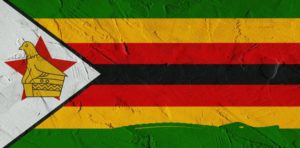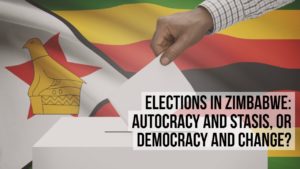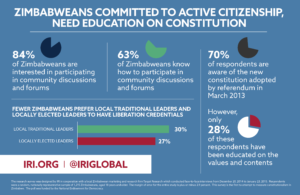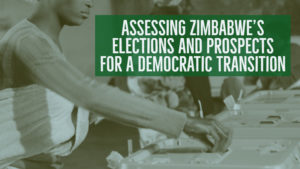 Zimbabwe’s state security agencies are suspected to have been involved in incidents that have targeted scores of opposition supporters, rights activists and even comedians who poke fun at political leaders. The heavily armed agents reportedly raid homes during the night. Such incidents happened during the long rule of Robert Mugabe but are now resurfacing under the new president, Emmerson Mnangagwa. Rights lawyers say the government is not doing enough to protect its citizens and investigate cases of torture, Deutsche Welle reports.
Zimbabwe’s state security agencies are suspected to have been involved in incidents that have targeted scores of opposition supporters, rights activists and even comedians who poke fun at political leaders. The heavily armed agents reportedly raid homes during the night. Such incidents happened during the long rule of Robert Mugabe but are now resurfacing under the new president, Emmerson Mnangagwa. Rights lawyers say the government is not doing enough to protect its citizens and investigate cases of torture, Deutsche Welle reports.
“The Zimbabwean state is failing to guarantee the personal security of its citizens,” Doug Coltart, a human rights lawyer and victim of police brutality, told DW. “Section 52 of the constitution guarantees the right of all people to freedom from violence from public or private sources. If anything, all of the evidence points towards the state being the primary perpetrator of the abuses,” he said.
 Zimbabwe’s government “must end its violent crackdown on dissent in the country and immediately investigate reports of beatings and torture by state security agents,” said Jon Temin, director of Africa programs at Freedom House.
Zimbabwe’s government “must end its violent crackdown on dissent in the country and immediately investigate reports of beatings and torture by state security agents,” said Jon Temin, director of Africa programs at Freedom House.
“These attacks violate Zimbabweans’ rights to free assembly, association, and expression, and have continued despite repeated promises by President Emmerson Mnangagwa that his government would usher in a new dispensation that respects fundamental rights,” he added, referring to assaults in the wake of protests organized by the opposition Movement for Democratic Change (MDC) due to take place in the capital, Harare.
Mnangagwa’s first year in office marked by a “systematic and brutal crackdown on human rights,” said Amnesty International. It has documented at least 15 killings by police when nationwide protests erupted on 14 January, sparked by the announcement of fuel price hikes.
 This was supposed to be Zimbabwe’s chance at a fresh start, note ngman Robert Mugabe was forced from office in late 2017 after a 37-year rule that left the economy in ruins. His ouster sparked celebrations in the streets and hopes of a recovery for the resource-rich nation. But his successor has failed to deliver on his promises of a revival.
This was supposed to be Zimbabwe’s chance at a fresh start, note ngman Robert Mugabe was forced from office in late 2017 after a 37-year rule that left the economy in ruins. His ouster sparked celebrations in the streets and hopes of a recovery for the resource-rich nation. But his successor has failed to deliver on his promises of a revival.
Zimbabwe Congress of Trade Unions president Peter Mutasa said workers are bearing the brunt of the deteriorating economic crisis. “The power crisis is the last nail in the coffin of a deteriorating economy. We have always been advocating for companies to treat their workers fairly in this crumbling economy. We do find that most companies are retrenching and this puts workers in a difficult position,” he said.
Police last week arrested 10 union officials as they tried to lobby the finance minister over low pay for teachers, witnesses said. Nevertheless, Zimbabwe’s unions still found the time to express solidarity with the pro-democracy struggles of their union comrades in Hong Kong. The ZCTU and the HKTU are supported by the Solidarity Center, a core institute of the National Endowment for Democracy.
We stand in solidarity with the workers in Hong Kong who are fighting against dictatorship, repression and arbitrary policy making.
Workers must continue to defend their freedom and political rights. You inspire many workers under dictatorships.
Long live workers struggle!! https://t.co/rIcoPx3F4F
— ZCTU – Zimbabwe (@ZctuZimbabwe) August 28, 2019
Mnangagwa has launched four dialogue initiatives, notes Brian Raftopoulos, a Research Fellow at the University of the Free State:
 Political Actors: This involves about 17 political parties that participated in the 2018 elections. They all have negligible electoral support and are not represented in parliament. ..
Political Actors: This involves about 17 political parties that participated in the 2018 elections. They all have negligible electoral support and are not represented in parliament. ..- The Presidential Advisory Council: This was established in January to provide ideas and suggestions on key reforms and measures needed to improve the investment and business climate for economic recovery. This body is largely composed of Mnangagwa allies.
- The Matabeleland collective: This is aimed at building consensus and an effective social movement in Matabeleland to influence national and regional policy in support of healing, peace and reconciliation in this region. ….
- The Tripartite National Forum, launched in June, 20 years after it was first suggested by the Zimbabwe Congress of Trade Unions. …..
There is clearly a strong need for a national dialogue between the major political players in Zimbabwean politics. But there is little sign that this will proceed. Moreover, the current position of regional players means that there is unlikely to be any sustained regional pressure for such talks in the near future, Raftopoulos writes for The Conversation.
There has been a closing of ranks around a fellow liberation movement in the Southern African Development Community (SADC) region, he adds, and Mnangagwa’s recent appointment as Chair of the SADC Troika on Politics, Peace and Security in Tanzania will only further cement this solidarity.







